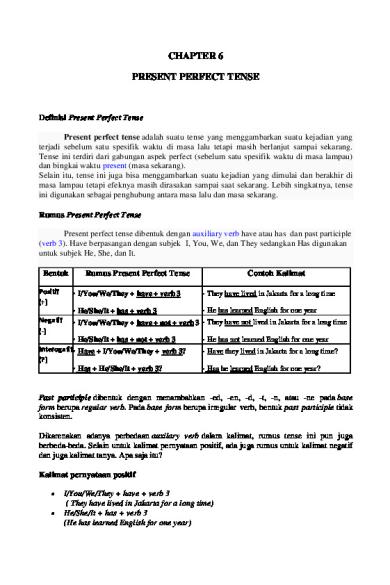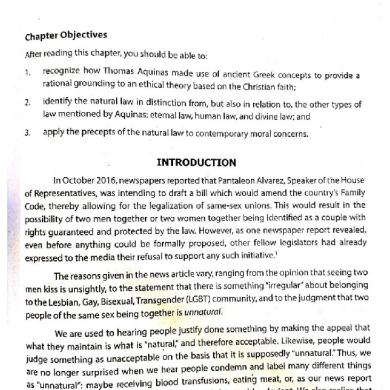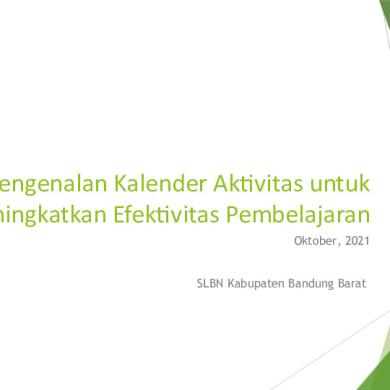* The preview only shows a few pages of manuals at random. You can get the complete content by filling out the form below.
Description
CHAPTER 6 PRESENT PERFECT TENSE
Definisi Present Perfect Tense Present perfect tense adalah suatu tense yang menggambarkan suatu kejadian yang terjadi sebelum satu spesifik waktu di masa lalu tetapi masih berlanjut sampai sekarang. Tense ini terdiri dari gabungan aspek perfect (sebelum satu spesifik waktu di masa lampau) dan bingkai waktu present (masa sekarang). Selain itu, tense ini juga bisa menggambarkan suatu kejadian yang dimulai dan berakhir di masa lampau tetapi efeknya masih dirasakan sampai saat sekarang. Lebih singkatnya, tense ini digunakan sebagai penghubung antara masa lalu dan masa sekarang. Rumus Present Perfect Tense Present perfect tense dibentuk dengan auxiliary verb have atau has dan past participle (verb 3). Have berpasangan dengan subjek I, You, We, dan They sedangkan Has digunakan untuk subjek He, She, dan It. Bentuk Positif (+) Negatif (-)
Rumus Present Perfect Tense
Contoh Kalimat
· I/You/We/They + have + verb 3
· They have lived in Jakarta for a long time
· He/She/It + has + verb 3
· He has learned English for one year
· I/You/We/They + have + not + verb 3 · They have not lived in Jakarta for a long time · He/She/It + has + not + verb 3
Interogatif · Have + I/You/We/They + verb 3? (?) · Has + He/She/It + verb 3?
· He has not learned English for one year · Have they lived in Jakarta for a long time? · Has he learned English for one year?
Past participle dibentuk dengan menambahkan -ed, -en, -d, -t, -n, atau -ne pada base form berupa regular verb. Pada base form berupa irregular verb, bentuk past participle tidak konsisten. Dikarenakan adanya perbedaan auxilary verb dalam kalimat, rumus tense ini pun juga berbeda-beda. Selain untuk kalimat pernyataan positif, ada juga rumus untuk kalimat negatif dan juga kalimat tanya. Apa saja itu? Kalimat pernyataan positif
I/You/We/They + have + verb 3 ( They have lived in Jakarta for a long time) He/She/It + has + verb 3 (He has learned English for one year)
Kalimat pernyataan negatif
I/You/We/They + have + not + verb 3 (They have not lived in Jakarta for a long time) He/She/It + has + not + verb 3 (He has not learned English for one year)
Kalimat tanya/interogatif
Have + I/You/We/They + verb 3? (Have they lived in Jakarta for a long time?) Has + He/She/It + verb 3? (Has he learned English for one year?) Berikut adalah beberapa adverbs yang biasa digunakan untuk mengekspresikan present perfect tense:
Yet Already Just Ever Never Dan ketika kita berbicara dengan tindakan-tindakan yang belum selesai atau sebuah situasi tertentu, maka kita bisa mengunakan:
For Since
Waktu yang Tepat untuk Menggunakan Present Perfect Tense Bagaimana mengidentifikasi sebuah kondisi bahwa sebuah kalimat memiliki bentuk present perfect tense? Atau kapan saat yang tepat menggunakan tense ini? Kamu bisa melihat ciricirinya dengan contoh keterangan waktu alias time expression berikut ini.
Already Just Recently/lately Ever Yet For + keterangan waktu yang menunjukkan masa lalu hingga sekarang Since + keterangan waktu yang menujukkan pertama kali kejadian atau kegiatan dimulai
For dan Since Pada kalimat present perfect tense, keterangan waktu yang sering digunakan adalah for dan since. Penjelasannya adalah sebagai berikut:
For
Since
· Digunakan untuk menunjukkan berapa lama periode waktu berlangsung.
Contoh kalimat: I have lived in New York for five years. Artinya, lima tahun adalah berapa lama subjek I sudah tinggal di New York. · For dapat dihilangkan dalam suatu kalimat · Digunakan untuk menunjukkan kapan suatu present perfect tense karena keterangan waktu ini masih bisa dimengerti meskipun periode waktu dimulai. tidak disertai dalam kalimat. Contoh kalimat: Contoh: I have lived in New York since five years (+) He has worked here (for) several years. ago. (-) He has not worked here (for) several years.
Artinya, subjek I mulai tinggal di New York sejak lima tahun yang lalu.
(?) (For) how long has he worked here?
· Since tidak dapat dihilangkan dalam kalimat present perfect tense karena bisa menghilangkan fungsi keterangan waktu itu sendiri dan makna kalimat.
· Ada beberapa kata kerja yang tidak bisa digunakan bersamaan dengan kata for, seperti:
Contoh: began arrive meet end leave stop (+) He has worked here since June. She has arrived in New York for two years. BUKAN: He has worked here June. Kalimat ini tidak benar karena kata arrive menggambarkan kejadian yang terjadi sekali (-) He has not worked since June dan tidak berlanjut untuk suatu periode Bukan: He has not worked June. waktu tertentu.Kalimat yang benar seharusnya berbentuk simple past sebagai berikut: (?) Since when has he worked here? She arrived in New York three years ago.
Bukan: when has he worked here?
Menggunakan Present Perfect dalam Bentuk Pasif Kita sudah melihat contoh-contohnya ketika berbentuk aktif, yaitu ketika subjek digambarkan sedang melakukan suatu tindakan. Ketika kita menggunakan bentuk pasif, kita berfokus pada apa atau siapa yang menerima tindakan. Kita bisa menggunakan bentuk pasif hampir dalam
semua tenses dengan cara menambahkan verb “to be” sebelum kata kerja. Contohnya, dalam present simple:
Bentuk aktif: People collect the goods. Bentuk pasif: The goods are collected.
Pada bentuk past simple, kalimat tersebut menjadi:
Bentuk aktif: People collected the goods yesterday. Bentuk pasif: The goods were collected yesterday.
Apabila diperlukan, kita bisa mengekspresikan hal yang sama dengan present perfect:
Bentuk aktif: People have collected the goods. Bentuk pasif: The goods have been collected.
Penggunaan tense ini dalam bentuk pasif sebenarnya sama tujuannya dengan bentuk aktif, yaitu untuk mengekspresikan sesuatu yang baru saja terjadi, membicarakan pengalaman hidup, serta membicarakan tindakan-tindakan yang baru dilakukan. Dalam bentuk pasif dari present perfect, kita selalu gunakan has/have been + V3. Berikut ini ada beberapa contohnya:
The interns have been trained. The proposals have been written. Have the applicants been interviewed? The applications haven’t been checked yet. Has he been introduced to the new manager? He’s been taken to see the president. Sara has been promoted three times.
Penggunaan Kita telah mengetahui pengertian dan rumus present perfect tense. Untuk bisa menggunakan dan mengenalinya dengan tepat, kita juga harus memahami penggunaannya, yaitu sebagai berikut: Penggunaan
Contoh Kalimat · We have lived in New York for three years.
360p geselecteerd als afspeelkw
· She has studied in Melbourne since two years ago. a) Untuk menjelaskan suatu kejadian yang dimulai pada masa lampau (past) dan masih berlanjut sampai sekarang.
Kedua kejadian tersebut dimulai pada masa lampau dan masih berlanjut sampai sekarang. Artinya, We masih tinggal di New York dan
She masih belajar di Melbourne sampai saat ini. · I have tasted the cake
· Alan has lied to all of us
b) Untuk menjelaskan kejadian yang dimulai dan berakhir di masa lampau dan efeknya masih berlanjut sampai sekarang.
Kedua kejadian tersebut dimulai dan berakhir di masa lampau dan efeknya masih bisa dirasakan sampai sekarang. Artinya, I masih bisa merasakan rasa kue tersebut meskipun sudah mencicipinya pada masa lalu. Dan, kebohongan Alan masih bisa dirasakan meskipun Alan berbohong pada masa lalu juga. Jadi, gunakan present perfect tense. · Alex has called you five times
· I have read the book several times Semua kejadian tersebut merupakan kejadian c) Untuk menunjukkan bahwa suatu kejadian yang terjadi berulang kali di masa lampau. Biasanya menggunakan adverb of number. terjadi berulang kali di masa lampau. · My father has just gone to the office.
· They have just announced the winner. Semua kejadian tersebut baru saja terjadi. d) Untuk mengungkapkan kejadian yang baru Biasanya kata adverb just digunakan untuk tujuan ini. saja terjadi atau dilakukan.
Perlu diingat bahwa present perfect tense digunakan pada kejadian yang menghubungkan antara masa lalu (past) dan masa sekarang (present). Apabila kita bisa mengingat hal ini, present perfect tense adalah hal yang mudah untuk dimengerti. LATIHAN SOAL Use the words in the brackets to complete the questions (Gunakan kata-kata yang terdapat di dalam kurung untuk melengkapi kalimat di bawah) 1. Almaida is looking for his wallet, she can’t find it, She … his key. (lose) a. Have lost c. has lost b. will lost d. is loosing 2. I have made a letter, but I ….. to Zaid (report)
a. Have reported c. has reported b. Have not reported d.has not reported 3. My young brother …. ball to his friend. (bring) a. Have not bring c. does not bring b. Have brought d. will bring 4. They went to your house, but You … At home (be) a. Have not been c. have been b. Has not been d. has been 5. You … In this house (live) a. Have lived c. don’t live b. will live d. are living 6. Tiago and Toni …. to Jakarta. (go) a. Have gone c. has gone b. will go d. is going 7. They ,,,, rocks to his house (throw) a. Have thrown c. has thrown b. will throw d. are throwing 8. We … a bioscop ticket last time, (buy) a. Have not bought c. have bought b. Has not bought d. has bought 9. Would you like something to drink? No, thanks. I …. So much? ( have) a. Have drunk c. has drunk b. Will drank d.am drinking 9. My Mother… a coconut tree for You. (plant) a. Have not planted c. have planted b. Has not planted d. has planted 10. What time is Tamara Studying? She … last time.(study) a. Has studied c. have studied b. Has not studied d. has not studied 11. I ,,, a new motor cycle in the store.(take) a.
Have taken
c. am take
b. Has taken d. am not taking 12. Sabrina is away on June, Sabrina … in Surabaya. (come) a. Have not come c. have come b. Has not come d.has come 13. Zaid is back home from holiday now. Zaid … to Jakarta. (go) a. Have not gone c. have gone b. Has not gone d.has gone 14. Is Fadil in your home? No Fadil … to market (go) a. Have not gone c. have gone b. Has not gone d. has gone 15. She told Ameera about her house, but Ameera … it. (forget) a. Have not forgotten c. have forgotten b. Has not forgotten d. has forgotten 16. My mother told me this recipe, But I … it (make) a. Have not made c. have made b. Has not made d. has made 17. You have cooked a fried chicken, but you … it. (eat) a. Have not eaten c. have eaten b. Has not eaten d. has eaten 18. Abdullah has bought a new motor cycle, But He …. It . (use) a. Have not used c. have used b. Has not used d. has used 19. Has She …. To Tangerang last month? (go) a. gone c. went b. not gone d. going 20. Fadilla can’t find her wallet, Have you … it?. (know) a. known c. knew b. not known d. knowing 21. I can’t meet my wife , Have you … it? (see) a. b.
seeing seen
c. saw d. see
23. They … the bear in front of my home. (watch) a. b.
Have not watch will watch
c. does not watch d. Have watched













